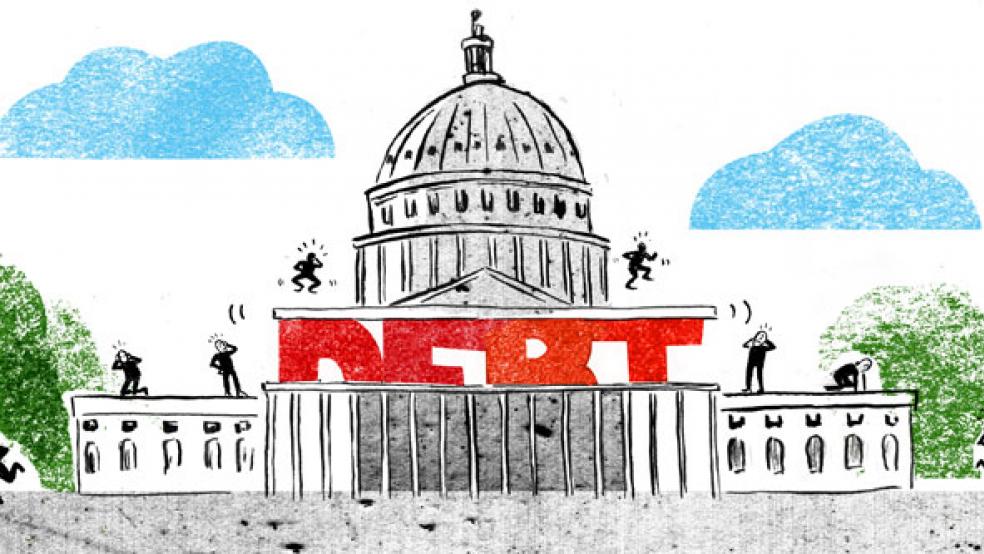At a time when worldwide confidence in the U.S. has already been badly shaken by President Trump’s go-it-alone, “America First” approach to trade, NATO and climate change, a White House riven by dissension is generating yet another controversy -- this time over whether the U.S. will honor its debt.
The U.S. could exhaust its legal borrowing authority of nearly $20 trillion this summer and will need congressional approval to raise the debt ceiling to avert the first-ever default on U.S. borrowing. The problem is that the Treasury is burning through its cash reserves at a faster clip than previously anticipated while the flow of tax revenue has fallen off.
Related: Donald Trump and America’s Benighted Self-Interest on Climate Change
The Trump administration wants Congress to raise the debt ceiling before the long August recess. But Treasury Secretary Steven Mnuchin and Office of Management and Budget Director Mick Mulvaney are bumping heads over how best to enact the new legislation.
Whether the White House and congressional leaders can get their act together quickly enough to pass a bill within the next two months remains to be seen. Under a worst-case scenario, the government this fall would be forced to begin withholding interest payments to some of its creditors, halt the issuance of Social Security checks, furlough hundreds of thousands of federal employees and temporarily close national parks and many government agencies.
Raising the debt ceiling has long been one of the most onerous and politically charged chores Congress must undertake to preserve the credit-worthiness of the country and avoid a default on borrowing that could rock the economy and lead to a partial government shutdown.
Capital Economics in a May 31 letter to its clients warned of the risk of a “damaging standoff” between the White House and Republican and Democratic lawmakers that would distress the financial markets and reduce the chances of any later agreement on tax cuts.
Related: New Debt Ceiling Deadline Could Ruin Lawmakers' Summer Vacations
“Depending on how long it lasted, a shutdown prompted by a failure to raise the debt ceiling could trigger a recession in the third or fourth quarters,” the letter stated. “It might also have longer lasting effects if it resulted in a rise in long-term interest rates reflecting a higher default premium on Treasury Securities.”
Mnuchin, the former Wall Street financier, has called for swift action on a “clean” debt ceiling bill unencumbered by other related budgetary and spending issues. Earlier this year, he instituted a series of short-term “extraordinary measures” at the Treasury to forestall exhausting the government’s borrowing authority. Last week, he told members of Congress that the sooner they act on a new bill, the better, and that “it would be my preference” the legislation be devoid of riders.
Meanwhile, Mulvaney, a scrappy former House member from South Carolina and co-founder of the arch-conservative Freedom Caucus, is demanding that Congress load up the bill with tough policies for reducing spending and slowing the long-term growth of the debt.
During an interview this week with the Washington Examiner, Mulvaney compared the debt ceiling to a fiscal “smoke alarm” that “has traditionally been used to step back and try and maybe assess why we are spending more than we have, and what are we are going to do about it.”
Related: Trump Budget Finds $0 in Wasteful Pentagon Programs. Are They Kidding?
As a three-term member of Congress, Mulvaney repeatedly pressed for spending reforms linked to a vote on raising the debt ceiling. He argued that the consequences of failing to increase borrowing authority in a timely fashion were not as serious as portrayed by the Obama administration, financial experts and credit rating agencies such as Standard & Poors or Moody’s.
As a freshman GOP lawmaker during the 2011 debt crisis in which the government came within hours of defaulting on U.S. obligations, Mulvaney argued that the Treasury could “prioritize” debt. That would mean essentially picking winners and losers in deciding which creditors -- such as China and Japan -- and government agencies would receive timely payments and which would be pushed to the back of the line.
By openly challenging Mnuchin on debt management questions that have historically been the purview of the Treasury secretary, Mulvaney may be trying to stir up the pot on Capitol Hill by galvanizing his conservative GOP allies to demand that new debt ceiling legislation is laden with politically face-saving anti-deficit amendments.
Stan Collender, a prominent federal government budget expert and blogger, said on Friday that it was unusual to see the administration’s two top players on the spending and fiscal matters air their differences over the debt ceiling so publicly.
Related: Treasury Secretary Gets Grilled on Trump's Budget 'Draft'
“I’ve got to believe that Mulvaney is either speaking for Trump or is speaking with his tacit approval,” Collender said in an interview. “Mulvaney is more of a political guy than Mnuchin and may be trying to make nice to the Freedom Caucus, which he may need in the future for other things.”
“It really puts a pre-August debt ceiling approval in jeopardy,” Collender said. “And it’s not clear to me how long Mnuchin is going to stand for this – to be publicly humiliated and disagreed with by another member of the administration.”
“The larger issue is that this really puts tax reform in some jeopardy because Mnuchin is going to leave if this goes on,” Collender added.
White House officials sent mixed signals on Thursday about where President Trump comes down on the issue. An unnamed senior official apparently eager to see quick action on the debt ceiling told the Washington Post that “prioritizing might be technically possible, but it’s not actually feasible or even desirable.”
However, White House spokeswoman Natalie Strom told reporters: “The administration’s position is that the debt limit must be increased. The vehicle for increasing the debt limit is ultimately up to the Congress.”





